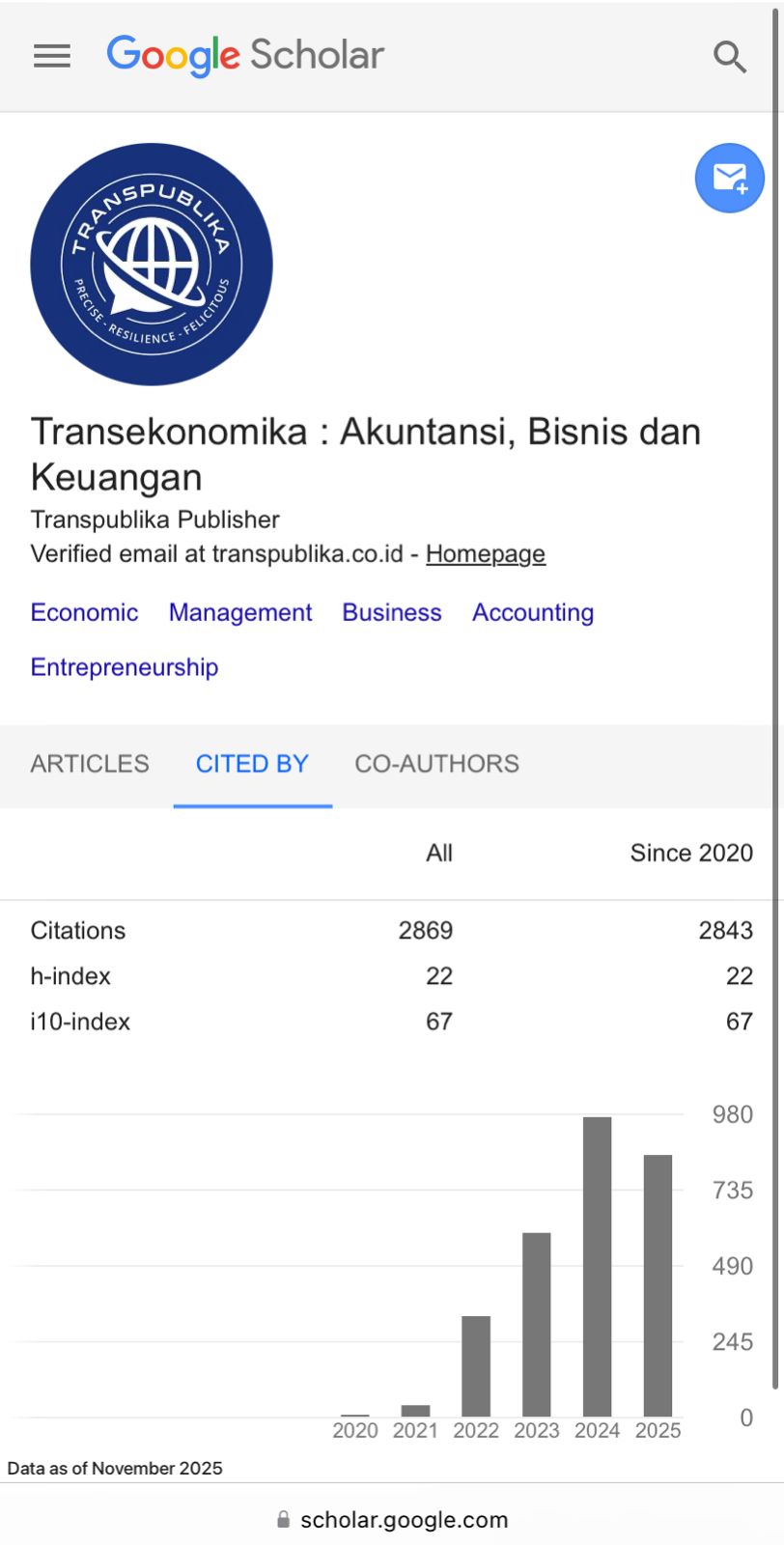THE INFLUENCE OF BUSINESS STRATEGY, SUPERVISORY EFFECTIVENESS AND SUSTAINABLE GROWTH RATE IN BANKRUPTCY PREDICTION
Abstract
This research aims to test and prove how influence business strategy, supervision effectiveness and sustainability growth level have in predicting bankruptcy. The research is quantitative research, which uses a panel data regression analysis model. The research sample is companies that are included in the special monitoring category of the Indonesia Stock Exchange in April 2024, with PKPU status or have negative equity in companies operating in the property and real estate industry. The results of the research show that business strategy, supervision effectiveness and the level of sustainability growth of a company have a significant influence of 49% in predicting bankruptcy of companies in the property and real estate industry in the 2019 - 2023 research period. Meanwhile, business strategy and supervision effectiveness have a positive influence. against Financial Distress. Meanwhile, the Sustainability Growth Rate has a negative effect on Financial Distress, where the more a company does not experience sustainability, the closer it is to the bankruptcy area. Meanwhile, firm size as a control variable in this study does not have a significant effect on Financial Distress.
Downloads
References
Agustia, D., Muhammad, N. P. A., & Permatasari, Y. (2020). Earnings management, business strategy, and bankruptcy risk: evidence from Indonesia. Heliyon, 6(2).
Alexeyeva, I., & Sundgren, S. (2022). Do going concern disclosures in the management report and audit report signal bankruptcy risk? Evidence from privately held firms. International Journal of Auditing, 26(2), 171–192.
Awaliah, R., Damayanti, R. A., & Usman, A. (2022). Tren Penghindaran Pajak Perusahaan di Indonesia yang Terdaftar di BEI Melalui Analisis Effective Tax Rate (ETR) Perusahaan. Jurnal Bisnis Dan Akuntansi Kontemporer, 15(1), 1–11.
Bansal, P., & DesJardine, M. R. (2014). Business sustainability: It is about time. Strategic Organization, 12(1), 70–78.
Charalambous, C., Martzoukos, S. H., & Taoushianis, Z. (2022). Estimating corporate bankruptcy forecasting models by maximizing discriminatory power. Review of Quantitative Finance and Accounting, 58(1), 297–328.
Lukito, D. P., & Sandra, A. (2021). Pengaruh Capital Intensity, Profitabilitas, Dan Financial Distress Terhadap Tax Avoidance. Jurnal Akuntansi, 10(2), 114–125.
Luu Thu, Q. (2023). Impact of earning management and business strategy on financial distress risk of Vietnamese companies. Cogent Economics & Finance, 11(1), 2183657.
Rahmana, D. A. (2022). Apakah Financial Distress Memengaruhi Penghindaran Pajak? Studi Kasus Pada Perusahaan Publik Di Indonesia. Jurnal Kajian Ilmiah Perpajakan Indonesia, 4(1), 24–42.
Susilawati, S. (2015). Pengaruh profesionalisme dan independensi auditor internal terhadap kualitas audit: studi pada inspektorat Propinsi jawa barat. Etikonomi, 13(2).
Taufik, M., & Muliana, M. (2021). Pengaruh Financial Distress Terhadap Tax Avoidance Pada Perusahaan Yang Terdaftar di Indeks LQ45. CoMBInES-Conference on Management, Business, Innovation, Education and Social Sciences, 1(1), 1376–1384.
Copyright (c) 2024 Niken Yulika Asmarani, Murtanto Murtanto

This work is licensed under a Creative Commons Attribution 4.0 International License.








.png)







.png)


.png)

.png)















